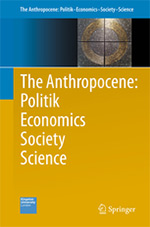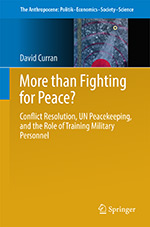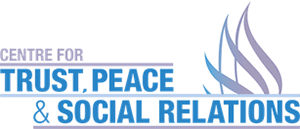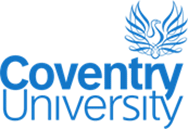|
|
| |
|
| |

The Anthropocene
Politik – Economics – Society – Science (APESS))
Edited by
Hans Günter Brauch,
AFES-PRESS, chairman
Free University of Berlin (Ret.)
A Peer Reviewed Book Series
ISSN: (Print)
ISSN: (Online)
APESS
Vol 8 |
David Curran: More than Fighting for Peace? The Role of Conflict Resolution in Training Programmes for Military Peacekeepers (Cham- New York - Heidelberg - Dordrecht - London: Springer International Publishing, 2017).
ISBN: 978-3-319-46303-2 (Softcover)
ISBN: 978-3-319-46305-6 (EBook)
Doi: 10.1007/978-3-319_978-3-319-46305-6 (add chapter no.)
Order this book on Springer Website |

|
| |
|
|
On this Book
This book provides a contemporary account of the linkages between the academic field of conflict resolution and the practice of military peacekeeping, through the lens of pre-deployment training for military personnel about to embark on UN peacekeeping operations. Military Personnel serving on United Nations peacekeeping operations are deployed into highly challenging post-conflict environments, where the likelihood of violence remains high. Moreover, these personnel are deployed part of a peace process, and are thus situated as an anchor point in a transition from war to peace. This dimension of their work therefore means that a range of skills and techniques are relied upon, which come not from traditional military training, but from other, non-traditional fields. It is into this gap where the academic field of conflict resolution has made a valuable contribution to understanding international peacekeeping. Since the 1970’s, studies have sought to understand international peacekeeping as a necessary stage in conflict de-escalation, and ultimately transformation. From this, there is a history of engagement including studies which seek to understand the skills peacekeepers may need to assist them in their day to day activities (such as approaches to negotiation, mediation, and cultural awareness), and the role that international peacekeeping plays in projects of conflict transformation.
However, a small number of these studies systematically explore the issue of the role of conflict resolution in training programmes for military peacekeepers. Although training is often cited as one of many factors in mission success, few studies actually seek to explore what non-military skills are focused on, and what methods are used to train peacekeepers. Thus, by examining training for military peacekeeping, the book will fill a critical gap in the field. By using the lens of training, the book offers a unique insight not only into the skills that are transferred (such as mediation, negotiation and cultural awareness), but the extent to which such training offers an appreciation of the role that peacekeepers play in conflict resolution. Moreover, the areas of training that the book will cover – negotiation, cultural awareness, and civil-military relations – are critical factors in peacekeeping operations, and provide a unique insight into the role of conflict resolution theory and practice. The analysis of training will allow wider insights to be made into future compositions of peacekeeping, and where conflict resolution can make an impact.
The book is split into three sections. Section one (chap. 2 & 3) examines academic and policy approaches to training peacekeepers in conflict resolution skills, incorporating approaches from the conflict resolution field, as well as developments in UN policy. Section two (chap. 4 & 5) looks at how these have manifested into training programmes in negotiation skills, cultural awareness, and civil-military relations. Section three (chap. 6) examines where this may take peacekeeping in the future, proposing possible cosmopolitan directions for the activity.
Contents
Introduction – Peacekeeping, Conflict Resolution, and the Role of Training – The Development of Training Structures in the United Nations – Negotiation Training for Military Peacekeepers – Civil-military relations – Towards the Military Conflict Resolution Practitioner? – Conclusion
On the Author
 |
Dr. David Curran is a Research Fellow at the Centre for Trust, Peace and Social Relations at Coventry University. His primary research interest is in developments in United Nations (UN) peacekeeping. Since completing his PhD at the Department of Peace Studies, University of Bradford in 2011, David has undertaken research into a range of topic areas including the role of conflict resolution in training programmes for military peacekeepers; Protection of Civilians in UN Peacekeeping; the evolution of rapid-reaction peacekeeping and peacebuilding forces such as the African Union standby brigades, EU battlegroups; and the potential of specialized UN rapid reaction capabilities. In addition, David has researched and published on the role of the United Kingdom in UN peacekeeping policy and practice.
David's research seeks to understand the extent to which international peacekeeping and peacebuilding missions form an effective tool of conflict resolution. This provides a lens to analyse a range of areas, from the training that peacekeeping personnel receive, to the wider principles that underpin peacekeeping operations, and the motivations of those who intervene.
Among his major publications are: “Perspectives on Peacekeeping and Atrocity Prevention - Expanding Stakeholders and Regional Arrangements” (co-editor, Springer, 2015); “Resonating, Rejecting, Reinterpreting: Mapping the Stabilisation Discourse in the United Nations Security Council, 2000-2014” (with Paul Holtom), in; Stability Journal (2015) "Training for Peacekeeping: Towards Increased Understanding of Conflict Resolution”, in; International Peacekeeping, 20,1 (March 2013); "The EU and the Third Pillar", in Fiott, D., Koops, J. (eds.), Operationalizing the Responsibility to Protect: A Contribution to Third Pillar Approaches, Basingstoke, Palgrave (2014); "The ‘Bradford model’ and the contribution of conflict resolution to the field of international peacekeeping and peacebuilding", in: UOC Journal of Conflictology, 3,1 (May 2012); (with Woodhouse, T.): "Cosmopolitan peacekeeping and peacebuilding in Sierra Leone: What can Africa Contribute?", in: International Affairs, 83,6 (November 2007).
Address: Dr. David Curran, Centre for Trust, Peace and Social Relations, Coventry University, Innovation Village Building No. 5, Cheetah Road, Coventry, CV1 2TL
Email: david.curran@coventry.ac.uk
Website: http://www.coventry.ac.uk/research/research-directories/researchers/david-curran-/
|
 |
 |
| A leading UK Centre for academic and research excellence |
| |
The Centre for Trust, Peace and Social Relations (CTPSR) builds on the strong and distinguished track record of scholars at Coventry University working on human security, peace studies and social relations. Working across disciplines and focused on these critical areas of socio-political and economic significance, the Centre has also drawn upon Coventry University’s active research on trust, creating a new and energetic combination of studies.
The University first established a research centre for the study of peace and reconciliation in 1999. Since that time the team have expanded and built an international reputation for their work with communities to transform approaches to positively address aspects of violent conflict at multiple levels including local communities, regions and nations. The work is truly global - delivering impact on both land and sea and across many cultures and religions. Additionally, the team support those directly affected by both man-made and natural disasters to increase resilience within their target communities. In 2014, new alignments were forged with academics working on social relations in diverse and multicultural communities in both peaceful and conflict areas, and on trust in organisational setting creating a leading UK Centre in its distinctive area.
This innovative work uses a holistic approach of direct engagement with grassroots organisations, which has transformational impact on the ground. Furthermore, the team is multidisciplinary with direct field experience of the whole conflict cycle: conflict prevention, conflict response and conflict mitigation. The immense value of the work is evident in the influence it has had on communities, and people, who deal on a daily basis with both violent conflict and with living in diverse societies.
The team adopts a multi-disciplinary approach that, through multi-level perspectives, brings together creative thinking on concerns of trust and trust repair, peacebuilding, peace and reconciliation and on the contemporary challenges of societal relationships in a diverse and connected world. Our portfolio of excellent and high-impact research seeks to change lives and enhance well-being
Our work provides insights for transformative change with a view to strengthening human security and resilience. We convene and contribute to public debates, provide effective policy guidance at local, national, regional and global levels and generate international collaborative research through our global networks.
Website: http://www.coventry.ac.uk/research/areas-of-research/trust-peace-social-relations/ |
|
|
|